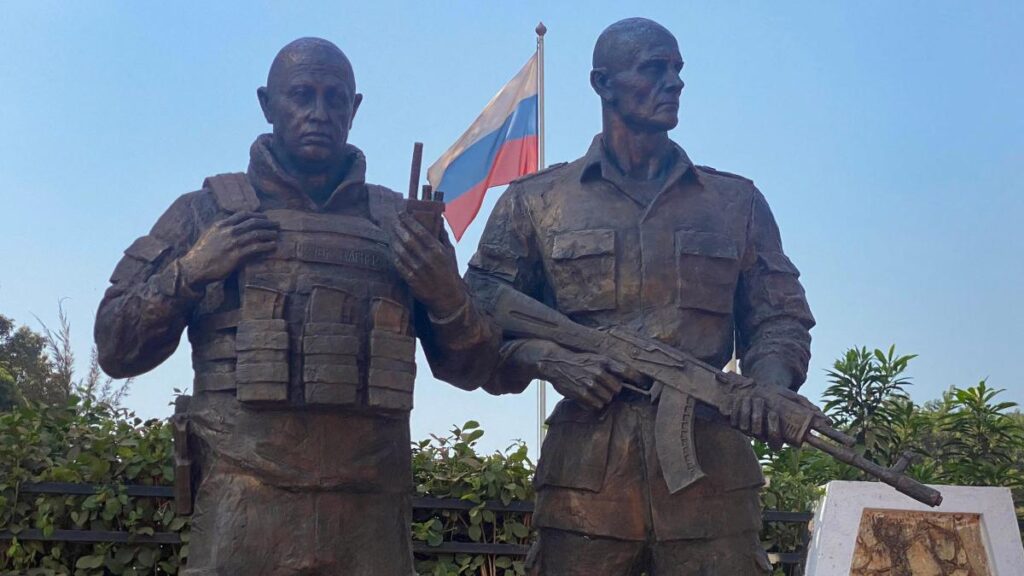A monument has been unveiled in the Central African Republic (CAR) to honor Yevgeny Prigozhin, the late leader of Russia’s mercenary Wagner Group. The statue, situated in the capital city of Bangui, commemorates both Prigozhin and his second-in-command, Dmitru Utkin, who both perished in a plane crash in August 2023. The monument portrays Prigozhin dressed in bullet-proof attire, holding a walkie-talkie, positioned next to Utkin, who is depicted with an AK-47 rifle. This unveiling signifies not only a tribute to the individuals but also highlights the Wagner Group’s enduring involvement in the region since their arrival in 2018 at the invitation of President Faustin-Archange Touadéra, aimed at combating rebel factions.
Since their establishment in CAR, Wagner’s subsidiaries have secured contracts for the operation of lucrative gold and diamond mines, indicating a significant intertwining of military force and economic exploitation in a nation rich in natural resources yet marred by poverty and instability. The unveiling ceremony, attended by top military officials including Defence Minister Rameau Claude Bireau, serves to affirm the bilateral relationship between CAR and Russia, underlining the strategic importance of Wagner’s actions in the region, which have ostensibly shifted the balance of power against local armed groups.
The context of the monument is critical, as it follows a turbulent period marked by Prigozhin and Utkin’s deaths in an aircraft crash shortly after their failed mutiny in Russia. While the Kremlin dismissed allegations of involvement in the crash, the tragedy underscored the precariousness of the Wagner Group’s operations and leadership. Following the incident, the Wagner Group was rebranded as Corps Africa but continues to operate under the Wagner name in CAR, illustrating the complexities of their ongoing presence and the continuing influence of Russian interests in the region.
In commentary surrounding the statue, President Touadéra has expressed support for the Russian presence in CAR, arguing that their cooperation has drastically improved security conditions by countering the armed groups that once destabilized the nation. Prior to the statue’s inauguration, another monument symbolizing Russia’s role in protecting civilians was already in place in Bangui, reinforcing the narrative of Russian forces as peacekeepers amid the country’s turmoil.
Despite being resource-rich, CAR remains one of the poorest nations globally and has suffered from nearly continuous unrest since gaining independence from France in 1960. The situation has improved somewhat in recent years, although sporadic violence persists, challenging the idea that pragmatic solutions have fully taken root. Tulder’s administration, with support from Wagner mercenaries, faces criticism for allegedly trading security for control over CAR’s valuable resources, prompting concerns over the potential exploitation of the nation by foreign interests.
Prigozhin’s Wagner Group was originally established in 2014, with operations initially focused in the Middle East and Africa, before being deployed to war fronts like Ukraine in 2022. The spotlight on the group’s figures, the statue’s unveiling, and Russian military involvement serve to evoke questions about the ongoing implications of foreign mercenary operations in fragile states, raising awareness of the nuances and consequences of such partnerships in geopolitics. The narrative now extends beyond mere commemoration, entwining local governance with foreign exploitation and armed presence, and setting a complex stage for CAR’s future.

